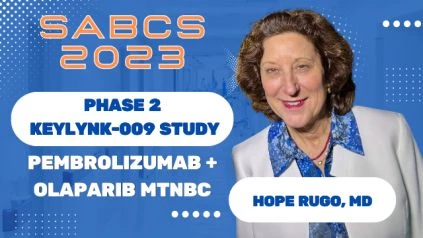By: Hope Rugo, MD
Date: 12/9/2023
At the SABCS 2023 conference, medical oncologist Hope Rugo from the University of California, San Francisco, engaged in a comprehensive discussion with interviewer Allen Wilbanks about the Keylink 009 study. Hope Rugo shared insights into the randomized open-label phase 2 trial, which aimed to assess the efficacy of the combination of Pembrolizumab and Olaparib as maintenance therapy for patients with triple-negative breast cancer (TNBC) receiving chemotherapy and Pembrolizumab.
The trial enrolled patients with metastatic or locally advanced unresectable TNBC who had not undergone prior treatment in the metastatic setting. The treatment protocol involved induction chemotherapy with weekly gemcitabine, carboplatin, and three-weekly Pembrolizumab for 18 to 24 weeks. Responding or stable disease patients were then randomized to receive either Pembrolizumab and Olaparib or continue with chemotherapy and Pembrolizumab.
Despite initial hopes, the study did not demonstrate superiority in progression-free survival or overall survival between the two arms in the overall intent-to-treat population. However, intriguing findings emerged when analyzing subsets, particularly in patients with tumor BRCA mutations. In this subgroup, there was a numeric difference favoring the non-chemotherapy arm with Pembrolizumab and Olaparib, raising questions about the potential benefits of maintenance therapy over continued chemotherapy.
Safety analyses revealed fewer grade 3 to 5 adverse events and less study therapy discontinuation in the Pembrolizumab and Olaparib group compared to the chemotherapy arm. Notably, infusion reactions were more favorable in the Pembrolizumab and Olaparib arm due to reduced carboplatin-related reactions.
Hope Rugo emphasized the need for further investigation into homologous recombination defect and methylation in tumor samples, as well as exploring the possibility of a Pembrolizumab-alone arm. The study’s results, while not definitive, provided valuable insights into potential treatment strategies for TNBC.

